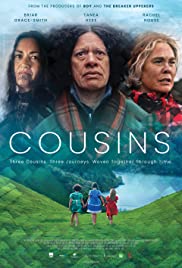
COUSINS
New Zealand, 2021, 98 minutes, Colour.
Tanea Hake, Briar Grace Smith, Rachel House, Ana Scotney, Chelsie Preston Crayford.
Directed by Ainsley Gardner, Briar Grace Smith.
Cousins comes from New Zealand. It is based on a popular novel by Patricia Grace, adapted into feature-length running time (though, certainly, there is more than enough material, more than sufficient characters for it to be developed into a miniseries).
The film opens with the introduction to three young girls, playing together, out in the countryside, Maori background. The voice-over tells us that they have happily come together, that they will be separated, but that they will come together again. And this sequence is repeated the end after we have shared the stories and journeys of the three girls – but especially of one, Mata, whose story is, in fact, a very sad one.
The audience has to keep attentive because there is a lot of moving from the present to the past, to various stages of the journey of the three girls.
The film also takes us back to the 1940s, incorporating footage from films and newsreels of the time, especially indication of the men who went to war and came back from the war. At various stages, the narrative moves into the 1950s, to the 1960s and beyond.
In the present, we see an older woman, bushy black hair, wrinkled face, overcoat, bag, standing at the city traffic lights, putting her thongs in her pocket, reciting chant about numbers from 1 to 10, waiting for the indication at the end of the green light, then crossing the road. She seems homeless, is given some food at a Chinese takeaway, dosses down. We discover that this is Mata – and we wonder how the little girl could have come to this. Tanea Hake is strikingly impressive as this bewildered adult Mata.
So, it is Mata’s story that absorbs us. We have seen the little girl. We have seen her as an orphan, bullied at the home, invited to share with the young girls whom she sees as cousins. But, she is one of New Zealand’s stolen generation children, taken from the orphanage by a dominating woman, who does express racial prejudice at times, severe on Mata and her upbringing. We also see the teenage Mata, rather reserved, having to leave home for the city, to get work. She does see a jovial young man on the train who later courts her and marries her. But, Mata is severely repressed – although, she does get an opportunity to blossom when a friend from the orphanage asks Mata mind her young son for some time and Mata and the boy bond – but he is taken away.
Some attention is given to the other two girls. Makareta eventually escapes an arranged marriage in the Maori tradition, goes to the city, studies law, becomes involved in civil rights issues. By contrast, Missy, marries the jilted man, a happy marriage, family, Missy being the custodian of the traditions.
The three women eventually do come together, the lost Mata eventually coming home, touches of sadness, but Missy (the always lively Rachel House) continuing her role as custodian.
We can welcome this opportunity to experience a New Zealand story, sharing the memories, sharing the hardships, acknowledge the oppression, and experience the sadness.
- An adaptation of a popular novel? Condensed for film running time? Choices for focus on particular characters, events, less attention to others?
- The timeline, going back to the 1940s and 50s, moving towards later decades? The intercutting of the decades? The intercutting of the stories of the three cousins into the different decades?
- The New Zealand countryside, the small towns, communities, Maoris and traditions? The contrast with the New Zealand cities? Universities, law and education? The homeless, the streets and traffic, Chinese takeaway…? The musical score?
- The opening, the voice-over, the comment on the three cousins, their being together, separated, coming together again? This repeated at the end?
- The principal focus on Mata, the impact of seeing her older, in the city, the traffic lights, the sandals in her pocket, the repetition of the numbers rhyme, crossing the street, her bag, her appearance, time ravaged face, distinctive hair, the coat? Dossing down? The food from the Chinese restaurant? A sad life, pathos? The filling out of her life, orphan, later revelation that her mother deserted her, the institution, the young Jean standing up for her against bullies, her going for a holiday and the encounter with the two cousins, happiness? Her being adopted, stolen generation, the harshness of her foster mother, her bigotry? Growing up, treatment, leaving, going to the town, accommodation, job, the young man on the train, meeting his relations, the engagement, the marriage, her innocence and ignorance, her wanting to have a child, his leaving her? Jean coming friendship from the past, her boy, asking Mata in to look after him, Mata bonding with him, the play, Jean returning and taking him away? The cumulative effect of these memories, sadness, Mata’s mental and emotional situation?
- Makareta, her leadership amongst the three, growing up in the community, the planned marriage, talking with Missy, running away? Her studies, law, her pursuit of indigenous issues? Older, seeing Mata in the street, almost run over by the vehicle, recognising the hair? Helping her, finding accommodation, communication with Missy? Enabling Mata to return to the community? Her death, the coffin, the image of the three women at the funeral?
- Missy, the Maori background, staying with the community, practical, marrying her husband after Makareta jilted him? The passing the decades, Missy as a guardian and custodian, the children, way of life – and the continued bond with her husband? And bringing Mata to stay with them?
- An opportunity to think about New Zealand history, the marry heritage, migrants, the experience of World War II and the soldiers, the return? Social changes over the decades?